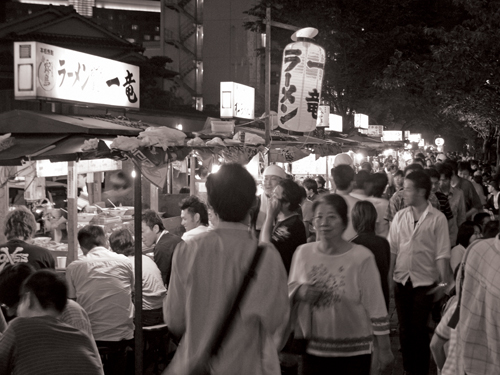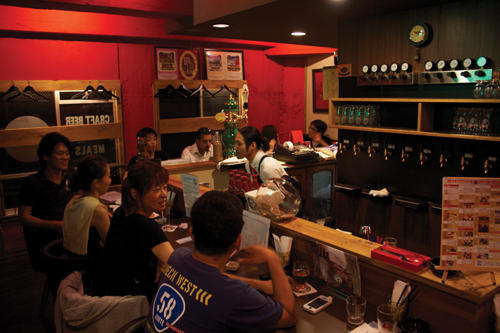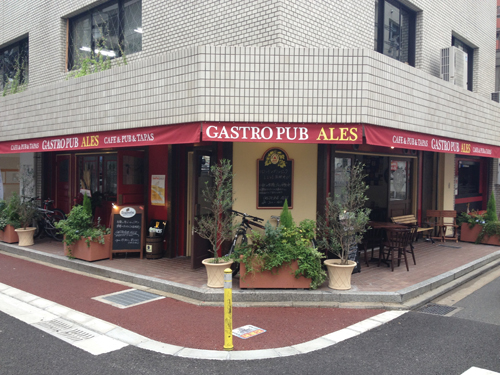
by Ry Beville
Fukuoka is an attractive, dynamic city with three breweries and a fourth just a short train ride to the north. You might expect its craft beer scene to be vibrant, but that’s not the case. At least, not until recently.
After lagging behind the rest of Japan’s major metropolitan areas, Kyushu’s largest city―and, in my opinion, one of Asia’s best―is showing every sign of an impending craft beer revolution. Much of that is being driven by new craft beer bar openings and more established places transitioning some of their taps to craft. Consumers, too, are catching on and spreading the word. Festivals are gaining steam. Bottled craft is appearing at unexpected places. Exciting new possibilities are on the horizon. Perhaps it’s time to start packing your bags for the narrow road to the deep south.
I’ve perhaps gained a keen perspective on the growth of craft beer in Fukuoka because that’s where my love of craft beer was born―and also where this magazine’s roots begin. My very first job in 1997 was in Fukuoka’s international center, where, incidentally, I helped produce a bilingual magazine. That experience launched me on my publishing career. The center was serendipitously right across the street from Shiroyama Hotel, whose brewery served me my first taste of Japanese craft beer. Although the brewery long ago relocated to Kagoshima, its lineup was―and still is―tasty and refreshing. Not but a few blocks away a bar called Cotton Fields was serving 600 varieties of world beer at the time. During the five years I lived in Fukuoka, I must have had hundreds of beers there. One of the bartenders always introduced me to new beers he thought I would like (more on him later). And in the more than ten years since leaving Fukuoka, I’ve traveled back multiple times a year, even living there in the summers some years. Not surprisingly, seeking good beer has been a big part of the entertainment.
Craft beer didn’t enter the Fukuoka drinking scene with a big bang; it was more like a slow creep. I remember Kato Hidenori of K’s Brewing Company being partially responsible for pushing craft beer into the mainstream. I first met him at the Craic & Porter, where crazy Mike Charron was perhaps the first Fukuoka bar owner to begin serving craft on draft. On subsequent trips, I would drop into Kato’s tiny brewery on the outskirts of town with Kenji, that Cotton Field’s bartender I mentioned above (again, more on him later). K’s Brewing is actually more popularly known as Brewmaster, which is also the name of Kato’s flagship pale ale. He opened his brewery in 2002, after being impressed with craft beer in America, and has been its tireless representative ever since. He has found particular success in getting his brews into department stores and for making beers using local products, namely cabos (a kind of citrus) and Fukuoka’s Amao strawberries. Admittedly, beer purists don’t much like these fruity beers, but that has not affected their popularity among other drinkers looking for something refreshing and easy to drink. At last year’s Le Beau Mariage (Japan’s premiere beer & food pairing event), Charlie Papazian (the American Brewers Assocation president) and Keith Villa (Blue Moon head brewer) both took an interest the Cabos Ale, commenting that it was champagne-like, something you’d especially want for brunch. Kato also helped organize last year’s Hakata Craft Beer Festival, which also seems to be gaining steam and attacting more bar owners curious about craft.
The festival is held in Hakata Riverain’s gorgeous atrium, which is right behind Hotel Okura, home to another brewery in its basement restaurant. Watanabe, its brewer for many years, was actually the first organizer of that festival, and was also responsible for greatly raising the quality and variety of beers offered from the brewery. His rauch (smoked beer) was a fantastic representative of that category. Watanabe now works in a different role for the hotel, but we hope (cont. on page 34) his legacy lives on.
Fukuoka City’s third brewery, Suginoya, is well off the beaten track, way out west in a quiet rural area with beautiful beaches, undeveloped hillsides and lots of small-scale farming. It’s hard-to-reach location is perhaps appropriate for a brewery that seems content to cater to visitors and locals―don’t expect to see their beers at many festivals or in many bars. You need to make the journey. It’s thankfully well worth it, also because Suginoya makes some great sake. Their main lineup includes a great pale ale whose recipe the brewer adopted from a Canadian brewery after spending a year training there, a slightly hoppy amber ale and a stout made slightly sweet with some honey malt.
Traveling all the way to Fukuoka but not visiting the Mojiko Retro Brewery would be a waste. I believe it’s one of the most underrated breweries in Japan, and its brewpub restaurant offers some stunning views of the port area outside. Regular trains from Hakata station take about an hour and a half, though the shinkansen and another local line will get you there in just a half an hour. You’ll still have plenty of time to get back to Fukuoka for its boisterous night scene.
Fukuoka is simply a fun city for going out. It’s downtown area has a high concentration of good restaurants, not to mention Fukuoka banner businesses like Ippudo (the famous ramen chain) and yatai (street food stalls). Thankfully, several of the establishments serving craft beer also offer great food. The appropriately named Gastropub Ales was one of the first in Fukuoka to offer a small, rotating selection of local craft beers, but the food has been as much a draw for many. I’ve taken several chef friends by there who praise the quality. Three Kings offers some of the best pub-style food in town and has recently transitioned to serving craft beer―selections from Baird and Coedo are usually on tap.
The situation really changed for Fukuoka’s craft beer scene, however, with the launch of Beer Paddy. Although a little outside downtown Fukuoka (two stops from Tenjin or a short cab ride), it opened last year with 10 taps of really good domestic and import craft beer. Finally, Fukuokans could try a great range of beers! More recently, Craft Beer Brim opened its doors in bustling Daimyo with an impressive serving system of 15 taps. Soft-toned walls with hanging plants add to an atmosphere of relaxation―definitely kick back here for a few drinks. Together, these two bars will ensure that word will spread quickly in Fukuoka about Japanese craft beer’s growing quality and diversity.
Several other establishments deserve mention for their important role as advocates for craft beer. Morris Inn in Daimyo has long been one of the most popular international bars in town, but mostly served mainstream world beers. Manager Yusuke, however, a fan of craft beer, went against his boss’ wishes and has been serving selections in bottles and on draught for some time now―I wish more managers had the courage to show their owners the light! The same company manages two other bars in town with similar offerings and concept: Black Sheep, just down the same street, and Hippo, which is located in Nakasu, not far from Hotel Okura and Cotton Fields. Right beside Hippo, interestingly enough, is Brooklyn Parlor Hakata, which is a fantastic café serving several selections of Brooklyn Brewery’s beers. Now that we’re in Nakasu, let’s take a closer look at Cotton Fields, one of Japan’s oldest beer bars. Friendly owner Moro’oka began stocking his country-western bar with world beers back when the bubble era was just beginning in the 1980s. Many of his beers would not be interesting to most Japan Beer Times readers―like the mainstream world lagers―but it’s still a great experience. Moro’oka has reduced his menu to about 400 beers from its peak of about 600, and there are more than a few gems. Moro’oka is a fan of Oktoberfest beers, but notes that his other favorties, Samuel Adams and Brooklyn Lager, are big sellers there. Cotton Fields’ rolled and fried tacos are legendary in Fukuoka.
From his three decades of serving much of the world’s beer in his bar, he has one story that always makes me laugh: “Once an Australian rugby team came in and got absolutely hammered. They were pissing in the glasses, which I decided to throw away.” Rugby teams, though, still welcome.
There are a few curiosities just a short walk across the river in Western Nakasu. Koshinraku specializes in horse meat and strong IPAs. Owner-chef Narita once lived in San Diego and developed a taste for hops while there. Ever paired raw horse meat with hoppy beers? Not too far away, you’ll find Manu Coffee’s Haruyoshi location. Owner Nishioka and team make the finest coffee in town and also serve Rogue. His newest location, in Daimyo, is a wonderful place to relax (or try to recover from a hangover). Just one station to the south―not too far from Beer Paddy, actually―is J’s Pub Monkey, a gastropub with a good menu of both food and beer. They boast a selection of 40 beers, though most of the craft is in bottles.
Lovers of German beer will delight in Bayern, a football/soccer-themed restaurant just west of city central which serves traditional German food and a good selection of dozens of German beers both on draft and in bottles. The front of the restaurant offers some of the best bakery items anywhere in the city.
I’m waiting to see if there will be an increase in selection of Belgian beers across the city with the inauguration of Belgian Beer Weekend Fukuoka―I hope so. In addition to that and the Hakata Beer Craft Beer Festival in the fall, there is also a small Fukuoka Oktoberfest in October.
But what I’m really interested in seeing is how the imminent opening of Goodbeer Faucets Fukuoka will change things! That’s right, the popular bar in Shibuya will be opening its second branch in an absolutely gorgeous location on Nakasu river, in Haruyoshi, around November. Fukuoka craft beer bar operators must be breathing a sigh of relief since the location is in a quiet pocket relatively distanced from everyone else, but either way, this new establishment will certainly raise the profile of craft beer in the city.
Maybe you’ll even see Kenji there, my old friend and the former bartender at Cotton Fields I mention above. Since the launch of the Japan Beer Times, he’s been our primary translator. Everything in Fukuoka comes full circle, I guess. Thank him for a job well done!


This article was published in Japan Beer Times # () and is among the limited content available online. Order your copy through our online shop or download the digital version from the iTunes store to access the full contents of this issue.



